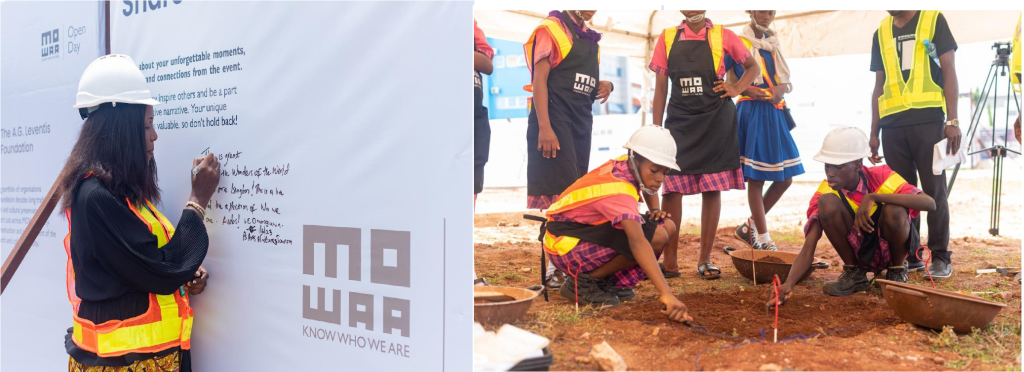
The Museum of West African Art, Edo (MOWAA), in its avowed desires to upgrade conservation efforts in Nigeria, has held a three-day event to educate visitors on the benefits it will offer the city in terms of investment, jobs and educational opportunities.
The event which was held on the site of the Pavilion, their first building dedicated to research and conservation in Benin City, was attended by NGOs, students, artists, artisans, community groups and curious residents.
Representatives from the National Commission of Museum and Monuments (NCMM), the Archaeological Association of Nigeria, the International Council of Monuments and Sites (ICOMOS), and the Universities of Benin and Ibadan were also in attendance.
Spotlight was placed on archaeology, providing a glimpse of what it looks like in practice. MOWAA hopes to upgrade conservation efforts in Nigeria, ensuring that any construction work that could damage surviving remains are properly protected and training specialists to professionalise heritage practice.
The three-day event which took place from June 1-3, provided informative tours of the future Pavilion centre and educated visitors on the benefits it will offer the city in terms of investment, jobs and educational opportunities.
Visitors were encouraged to try their hands out at a live dig, pottery workshops, and other exciting activities that highlighted the significance of archaeology in promoting community values and supporting local tourism.
Those in attendance learned how scientific studies of buried remains can help us uncover knowledge of our past – from ancient diets and farming practices to how great wall fortresses were built.
Development of the Pavilion is already underway, with completion scheduled for early 2024, which when completed will host state-of-the-art storage facilities, and the best equipped labs for conservation, digital production, archaeology and applied material science in West Africa.
The educational facility will also provide year-round professional training, internships and outreach activities to sustainably grow relevant skills for heritage and creative economies.
Eager to contribute to the education and development in Edo State, MOWAA has already begun delivering programmes, three of which were showcased during the Open Day.
These projects are in partnership with the National Commission of Museums and Monuments, the German Archaeological Institute (DAI), the British Museum, Cambridge Archaeological Unit, Wessex Archaeology and the Open Society Foundation.
The event also displayed ongoing outreach activities with local schools and community stakeholders undertaken since September 2022, when it started operations.
The event showcased a series of archaeological studies carried out prior to the construction in partnership with the British Museum and in close collaboration with the National Commission of Museums and Monuments.
These institutions have been supporting the local homegrown archaeological team to preserve remains that could be lost or damaged during the building process as well as educating volunteers from University of Benin.
According to the Director of the MOWAA, Ore Dish, “we are thrilled to open our doors to the community. This Open Day is a platform to foster a deeper understanding of the importance of archaeology in preserving our cultural legacy and share some of our exciting new discoveries.
“We are excited to get more cultural practitioners and residents in touch with the Pavilion’s work, which is already proving to be a dynamic space for research, education, and community outreach.
“None of this would be possible without our local and international partners, who are as committed as we are to serve communities in Nigeria”, Ore Disu posited.
In her opening remarks at the event, Ms. Anna Adamu-Abui, Director of the Institute of Archaeology and Heritage Studies stated that: “NCMM plays a dual role of supervising and collaborating with MOWAA in the research itself.
“The Commission has ensured that the ongoing project adheres to ethical and legal standards, including the protection of cultural heritage, in compliance with relevant regulations.
The benefit of collaborative research is demonstrated in the use of modern techniques and equipment, which I have personally experienced. These collaborations leverage on the expertise and resources of both institutions, leading to a more impactful and comprehensive research.”
You may also like
-
Leadership: Indigenes of Obarune Village Petition Oba of Benin Over Alleged Plan To Foist Non-Indigenes on Them
-
Modern Teaching Techniques: Edo Varsity Organises 2 Days Training For Academic Staff
-
Edo INEC Headquarters: How Edo Dep. Governor-elect, Takes Roles Of Security Guard
-
Edo Decides: Women Vow To Reclaim Ighodalo/Ogie Mandate
-
Edo 2024: Stop Misleading The Public – TAMO Tells REC